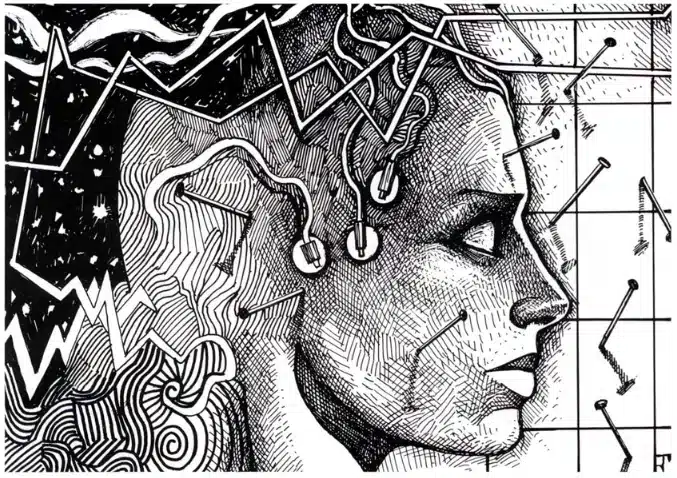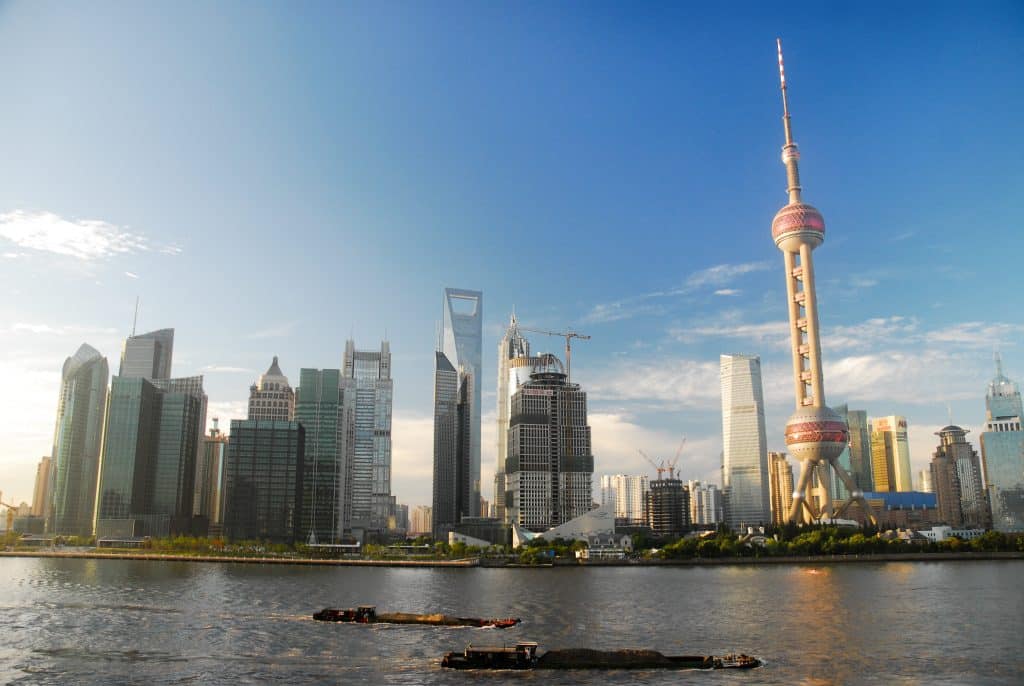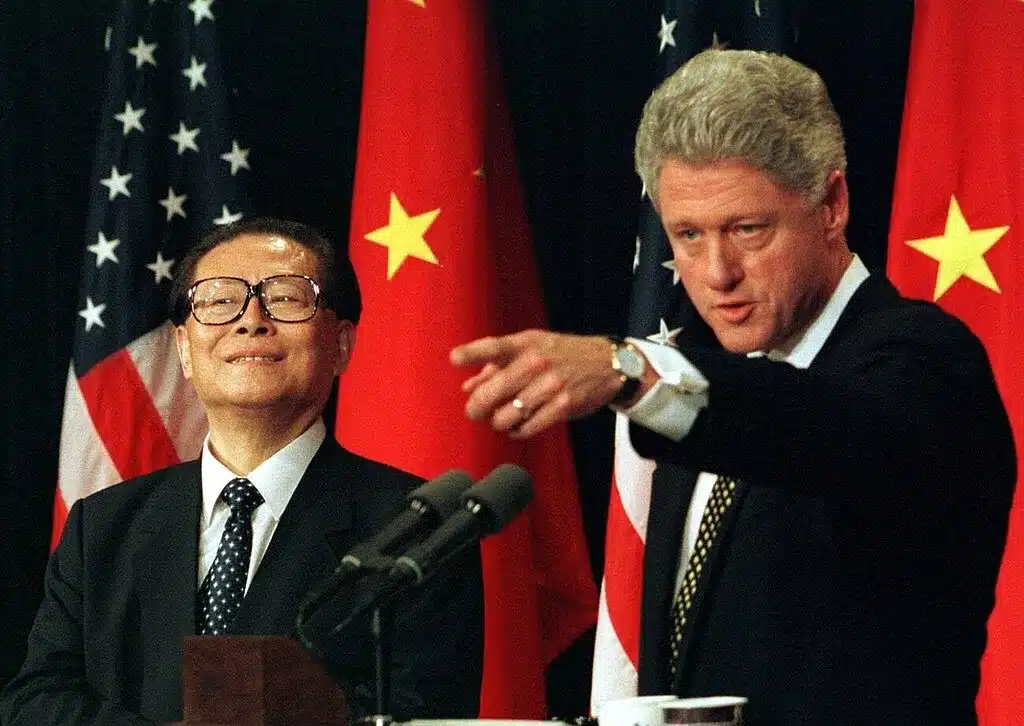The Centrality of the U.S. in China’s Quest for Modernization
This article was originally published in the China Research Center’s China Currents journal, and is republished with their permission. It is authored by Yawei Liu, the Senior Advisor on China at the Carter Center and the chief editor of the U.S.-China Perception Monitor.
Historian Michael Hunt believed the relationship between the U.S. and China is different from all the other American bilateral relationships because it has been buttressed by two pillars that are still central to the American exceptionalism.
The first pillar is the missionary impulse to change an atheist China into a Christian nation. The second is that China is such a huge market it will be central to consume all the commodities grown or manufactured by the most productive country in the world. When the missionaries and merchants ran into resistance, they called on the diplomats and military to reduce the stubborn Chinese resistance. If one examines China’s relationship with the U.S., a similar pattern could also be detected. And this pattern revolves around a central question of the role of the U.S. in China’s quest for modernization.
When Chinese elites believe the U.S. obstructs China’s quest, the policy response is hostile. But once elites are convinced the U.S. is central in facilitating China’s quest for national respect and strength, decision-makers can make swift changes to accommodate American arrogance and condescension.
Currently, it seems the U.S. is devoured by fear of a rising China and disgust that an ungrateful nation has taken advantage of generous and unsuspecting Americans. Washington is not in the mood to forge a special relationship with China. It does not believe it can easily or ever change China. It has also dawned on American decision-makers that doing business with China has only contributed to making China stronger and more powerful. Therefore, it is better to contain China, even if the cost is not having a robust commercial relationship with China. The thinking on the China side is quite different from the American mentality. Chinese leaders, elites and ordinary people are understandably upset, frustrated, and angry since the U.S. began to apply maximum pressure to stop China’s economic growth in the name of making America great and safe again, but they have not made up their minds on giving up on the U.S. as a facilitator for its modernization. Beijing seems to be giving Washington another chance to reconsider disengaging with China. At the same time, it is also doing everything to convince the U.S. that China can make America pay a price if it does not change its ugly policy of making China lose in an epic U.S.-China rivalry.
Leaning to one side
The Chinese Communist Party (CCP) celebrated its centennial last year. In merely 100 years, it has grown from an illegal political organization with about 50 members in 1921 to the largest political party in the world with close to 100 million dues-paying members. Looking back at its founding, it was, in fact, a strong reaction by the aspiring Chinese nationalists to President Wilson’s unfortunate betrayal of the Chinese cause at the Paris Peace Conference at the end of World War I. Their deep disillusionment with Western liberalism led to a pivot to Moscow and a growing adoption of the revolutionary doctrines of Marxism to bail China out of miserable humiliation at the hands of Western powers and their domestic collaborators.
The Japanese invasion of China temporarily restored the relationship between the CCP and the U.S. Members of the Dixie Mission found Mao Zedong and his CCP comrades leading a movement that was more admirable than that of the Nationalist Party. However, this brief period of mutual fascination was dashed by the new hostility between Moscow and Washington. Again Mao and his party were forced to choose sides in building his country up. CCP decided to lean to the side of the Soviets. The outbreak of the Korean War settled the dust in terms of U.S. policy toward Asia — all efforts had to be made to contain the spread of Communist agitation and to prevent a domino effect. This new policy led to the U.S. involvement in Vietnam after the Viet Minh drove the French forces out with support from China.
A year after President Richard Nixon made his historic trip to China, the U.S. finally ceased combat operations in Vietnam. The Shanghai Communique was not implemented because of domestic difficulties in both the U.S. and China. The Chinese government had not decided what it would take to make China a modern country. Future leaders in both countries were waiting to seize the decision-making power to seal the normalization deal.
Engagement
A new breed of leaders with moral authority and political courage finally came to power in Beijing and Washington. It was Jimmy Carter in the U.S. and Deng Xiaoping in China. To modernize and become a member of the global community, Deng made the decision to shelve crucial differences with the U.S. on the Taiwan issue. Deng famously commented that countries that chose to follow the lead of the U.S. had all become rich. In other words, China desired to be rich and would follow suit.
Deng made a triumphant visit to the U.S. during the lunar new year period in 1979 and a new page in U.S.-China relations was forged. China needed everything at the time, from military support to protect itself from any possible invasion from the USSR to capital to relaunch China’s economic growth, from good education and research opportunities for its students and scholars to markets for Chinese products. The U.S. had all of that and began to offer it with the hope Nixon best expressed in his 1967 article in Foreign Affairs: an engaged China would be a more peaceful China.
It was the U.S. turn to become deeply disillusioned and upset in the wake of the June 4 crackdown on student protest. For almost three years, the bilateral relationship was in a precarious situation. The U.S. imposed sanctions, and the new Chinese leadership turned sharply left in both political and economic terms. To salvage the reform and opening up policy, Deng launched his Southern Tour in early 1992 and with support from the military forced Jiang Zemin to change course. U.S. attempts to link China’s human rights record with its most favored nation trade status eventually was blunted by the business community and its supporters in Congress and the administration. Deng’s determination in pursuit of China’s modernization and Americans’ reluctant suppression of their frustration with the CCP paved way for China’s eventual ascension to WTO at the beginning of the 21st century. By 2010, China soared to become the second-largest economy in the world. Both countries benefited enormously from two decades of intimate economic engagement. There were constant frictions over many bilateral and multilateral issues, but Americans leaders were still embracing the hope a modernized China would be a friendly China.
The Pivot
The American policy community began to rethink its conventional engagement approach to China in 2012. It coincided with Xi Jinping taking over the CCP helmsmanship. When the Council on Foreign Relations and the Carnegie Endowment for International Peace jointly published a report entitled “Revising the Grand Strategy Toward China” in 2015, the Obama administration had already put the “Rebalance to Asia” policy in place. But China was still feeling good after it hosted President Obama at the APEC summit in 2014 and the G20 in 2015. It also began to prepare for the post-Obama years.
China was surprised by the election of Donald Trump and shocked when he took a call from Taiwan President Tsai Ying-wen. However, Chinese leaders seemed to believe President Trump, as the arch dealmaker, could be handled with sweet “deals.” The first deal was the visit by Xi Jinping to Mar-A-Lago in April 2017. Later in the year, the Chinese deal became even sweeter — a royal welcome of visiting Trump at the Forbidden City and signing of purchase agreements worth more than $240 billion. But President Trump and his lieutenants felt the Chinese government had failed to honor its pledges and launched the unprecedented trade war. COVID-19 had worsened the bilateral relationship, with the U.S. government embarking upon a whole of society and whole of government offensive against China. Under the U.S. assault, Beijing appeared to be reactive and tit-for-tat in nature. It even signed the first phase of the trade agreement, agreeing to buy $250 billion in American goods over two years. CCP leaders ate the bullets from Washington largely because of two convictions: first, that China’s economic growth could not be sustained if the two nations decoupled; and second, that it could afford to wait for a more sensible president to move into the White House.
That wait seemed to have paid off in 2020 when Joe Biden was elected president. President Biden has more knowledge about China than any previous American leader and even declared during his presidential campaign that he did not believe China was capable of having America for lunch. The Chinese hope that President Biden would de-escalate bilateral tensions and stabilize the relationship was quickly dashed shortly after President Biden took over the reins of American leadership and announced he would not allow China to realize its strategy of edging out the U.S. and become the world’s most powerful nation. Out of frustration, China’s top diplomat Yang Jiechi launched a fierce attack on the U.S. policy toward China in Alaska in March 2021.
Re-engagement, the Chinese way
President Biden and his China policy team has only made the life of Chinese leaders more miserable since coming to office. It has not only adopted Trump’s China policy wholesale but also made it more effective through domestic investment, alliance-building, and consistency in applying maximum pressure in the technological sector. China is more isolated than ever from the community of developed nations. Many began to fear if China, out of anger and frustration, was going to give up its effort to engage the U.S. and form a new coalition of the willing. The joint Russo-Chinese statement in February 2022 appeared to confirm this worst scenario. U.S. Secretary of State Antony Blinken’s China policy speech in May 2022, House Speaker Nancy Pelosi’s visit to Taiwan in early August, the U.S. National Security Strategy released on October 12, the U.S. National Defense Strategy that came out two weeks later, a series of China-related laws enacted by Congress, and executive orders from the Biden administration designed to accelerate high-tech decoupling have all made it clear to the top leadership in Beijing that the U.S. sees China as the only power in the world that has the intention and capability to threaten and displace the U.S.
In this climate, with the U.S. bent on containing China for more than five years and ignoring almost completely the Chinese demand to stabilize and repair the relationship, it would be no surprise if the CCP and its paramount leader Xi Jinping identify the U.S. as China’s No. 1 enemy and adopt a policy of disengagement before and during their historic 20th Party Congress. What is surprising is that China seems to have decided to give the U.S. another chance to stay in the framework of engagement initially advocated by Mao Zedong and Richard Nixon and implemented by Deng Xiaoping and Jimmy Carter. China’s Foreign Minister Wang Yi came to America in late September and told the American audience, “China’s course of modernization and journey to common prosperity for more than 1.4 billion people will provide more market and development opportunities for the United States and other countries in the world.” He went on to say, “China’s resolve to further advance reform and opening-up is certain.” Wang declared that China sees “three certainties” in the bilateral relationship: China’s engagement with the U.S. is certain if the U.S. does not seek to change China or use Taiwan to thwart China’s quest for modernization; China’s effort to strengthen economic cooperation with the U.S. is certain; and China’s readiness to cooperate with the U.S. to confront global challenges is certain.
This iteration of Chinese policy toward the U.S. was confirmed by Xi Jinping’s political report at CCP’s 20th National Congress. In Xi’s scheme, CCP’s central mission is to build “a great modern socialist country in all respects and to advance the rejuvenation of the Chinese nation on all fronts through a Chinese path to modernization.” In the foreign policy section of the report, Xi described China’s goal as adhering “to the right course of economic globalization” and playing “an active part in the reform and development of the global governance system.” He called upon all countries “to hold dear humanity’s shared values of peace, development, fairness, justice, democracy, and freedom.” It is clear, at least for now, that the CCP does not want to say good-bye to the bilateral engagement policy because China’s pursuit of modernization and its plan to make it happen by mid-century will be significantly disrupted if the U.S. decides to change its status from a friendly fellow traveler to a hostile interrupter or even a lethal sniper.
This may reflect a tactical decision rather than a strong conviction. Many Chinese decision-makers inside the CCP are probably convinced of the U.S. desire to contain China at all costs but believe that there are no other good alternatives for China. The CCP’s decisions to follow the Leninist flag at its founding in 1921 and to rely on Moscow in 1949 brought about catastrophes for China and its people. The decision to board the globalization train driven and maintained by the U.S. has resulted in transforming China into a wealthy and powerful country whose voice is now heard and respected in many parts of the world.
The road to becoming responsible stakeholders
In September 2005, U.S. Deputy Secretary of State Robert Zoellick delivered an important speech urging China to become a responsible stakeholder. He said, “China has been more open than many developing countries, but there are increasing signs of mercantilism, with policies that seek to direct markets rather than opening them. The United States will not be able to sustain an open international economic system – or domestic U.S. support for such a system – without greater cooperation from China, as a stakeholder that shares responsibility on international economic issues.”
America’s current complaints about China run far deeper than what was listed by Zoellick, but the central issue remains the same: the U.S. can play an indispensable role in shaping China’s future. It has played a crucial role in changing China beyond recognition in the past 50 years. China has not changed in ways desired or preferred by the American leaders and the people who elected them. But they need to be aware that giving up on engaging China is not just a dereliction of a noble duty but also risks making China turn to stifling isolationism, ugly xenophobia, and decapitating totalitarianism. In addition, handling this relationship irresponsibly may even drive the two countries into a conflict that would put China and many other nations’ quests for modernization on hold and drag the U.S. into yet another quagmire.
China obviously wants to be a responsible stakeholder in the global community. However, CCP will not get the pass if it refuses to change some of its beliefs and behavior. First, Xi Jinping and his lieutenants must be keenly aware of the fact that Americans are sincere in their concerns about what China is doing to its own people and to other countries, that they are upset by China’s economic statecraft that is defying international rules and norms, and that Americans may be bewildered by their own arrogance and strong clinging to racial superiority but harbor no evil plan to make China disintegrate and become a vassal state of the U.S. Second, Chinese leaders can believe as much as they want that their system of governance is far more superior and efficient in lifting people out of abject poverty and growing the economy, but every government needs to defend and guarantee certain universal values for its citizens, or it will eventually lose popular support. Last, ignoring the element of choice and accountability in exercising authority will only lead to unchecked and unbalanced power abuse that make a repeat of China’s long embrace of a feudal political system easy to envision.
For Washington and Beijing to peacefully coexist and become responsible stakeholders, the first step is for American elites to stop perceiving China as an evil power doing everything possible to undermine America as an idea, system of government, and economic superpower. The first step for Chinese decision-makers is to give up the idea that the U.S. is in irreversible decline and the notion that China is destined to represent the future. Both sides should be humbled by their seemingly intractable domestic problems and daunting global challenges. Only by becoming responsible stakeholders can the governments of the U.S. and China fulfill the mission of making the world peaceful and prosperous and allowing their people to pursue happiness freely and lawfully.








